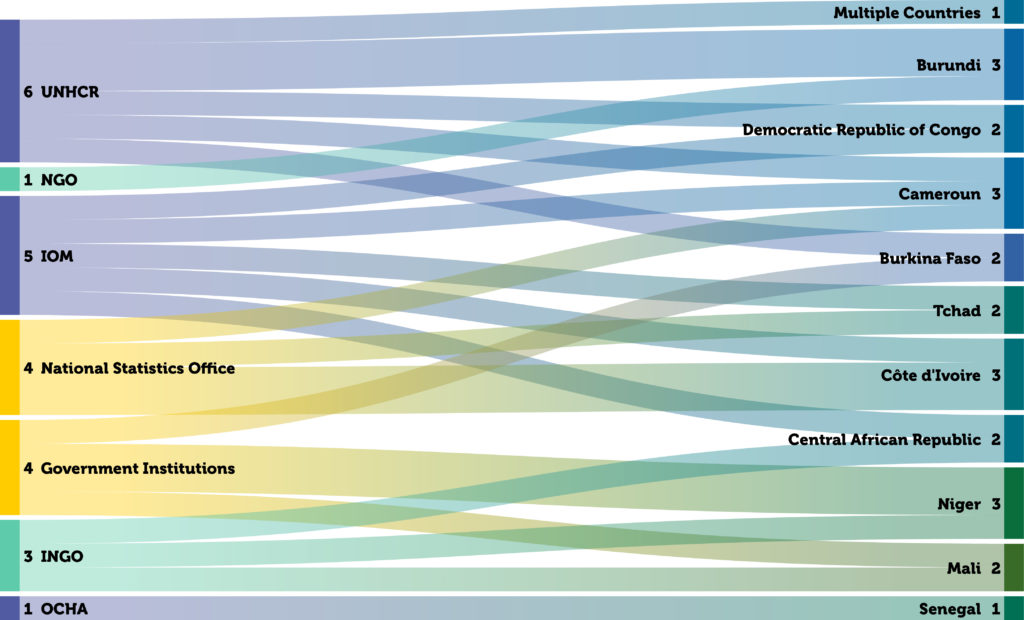For this year’s regional edition of our flagship training course, the Profiling Coordination Training (PCT), a five-member team of JIPS facilitators headed to Dakar, Senegal. They were joined by five external co-facilitators from our partners, OCHA and IOM with the Centre for Humanitarian Data, with whom we walked through the entire profiling process with this year’s 24 participants from government, NGO and UN organisations.
https://youtu.be/wBsoGRrs-98
This PCT was the first ever to be held entirely in French, and was driven first and foremost by our firm intention to respond to the demands coming from the field, in line with our strategic objective to enhance capacity building efforts both at the global and regional levels, as well as by specific encouragement from IOM’s regional office. With various displacement crises currently taking place in Francophone countries across Western and Central Africa, many of our partners encouraged us to make our main training course available in French for actors based in those regions.
Although we have supported profiling processes and other efforts in Francophone Africa in the past, notably in Côte d’Ivoire, the Central African Republic and the Democratic Republic of Congo, we had yet to fully gear our most important capacity building tool for a French-speaking audience. Therefore, for the purpose of this training, our main course material, the Freedonia country scenario, as well as all presentations and handouts were reviewed, updated and translated into French.

8 of the 24 participants came from government institutions and national statistics offices, and 3 from local NGOs. (Data visualisation implemented with Flourish)
The participants’ varied backgrounds and the interest demonstrated by the high number of applications also highlighted the value of targeting the training to this specific region. Of the 23 participants who joined us in Dakar, over a third work for local or national government departments, national statistical offices (NSOs), or NGOs directly involved in tackling the crises in the region. Other participants joined us from UNHCR, OCHA and IOM’s offices in the region. We were also happy to be joined by the Head of OCHA’s Office for West and Central Africa, Sofie Garde Thomle, to welcome participants and contextualise the strategic objectives of the training within the regional displacement context.
After each PCT, we gather feedback from participants and partners. This year, as usual, we found the feedback was very positive: when asked if the training had allowed participants to achieve the learning goals they had set out to reach, 92% of respondents to our final course evaluation said they had met their personal objectives. Participants’ feedback and the full findings our final evaluations forms will all be made available soon, along with our upcoming full report on the 2019 PCT.
“Before the training, we worked more or less in the field of profiling, but we were limited in what we could do. We were perhaps not very well equipped. But, with this training, we have lifted enough doubts, and I think we’re good to go now,” participant Kô Fié Didier Laurent Kra, of the Côte D’Ivoire Institut National de la Statistique (INS) told us, when we asked about his main takeaway from the course.
The number of overall applications was also noteworthy: around 70 people applied to the 25 spots available at the training, showing there is a real interest from Francophone contexts and continued interest in the course overall. This high demand is also reflected in the variety of issues applicants wanted to discuss, which begs the question of how we can improve future PCTs to accommodate for this. For JIPS’ Information Management Officer in charge of the training, Svend-Jonas Schelhorn, the challenge for future courses lies in finding innovative approaches to include the increasing number of themes and skills critical to profiling into the already packed 6-day training, such as community engagement, durable solutions analysis, data protection and joint analysis.
“The PCT keeps getting bigger and bigger, and the demand for topics to include in it is also increasing, so we face the challenge of responding to this demand while also keeping the training feasible in a 6-day format. This could mean including more e-learning tools or other ways to cover even more subjects,” Jonas said.
Planning for a PCT is a very intense process but also a rewarding one, and we are looking forward to continuing on this journey and to continue to tailor our trainings to respond to and help inform solutions to displacement with our partners.
—
Are you interested in taking part in a Profiling Coordination Training? We hold a yearly training course, alternating between global-level courses in Geneva and editions with a focus on specific regions in varying locations. Find out more about the PCT and get in touch on info@jips.org, Twitter or LinkedIn.